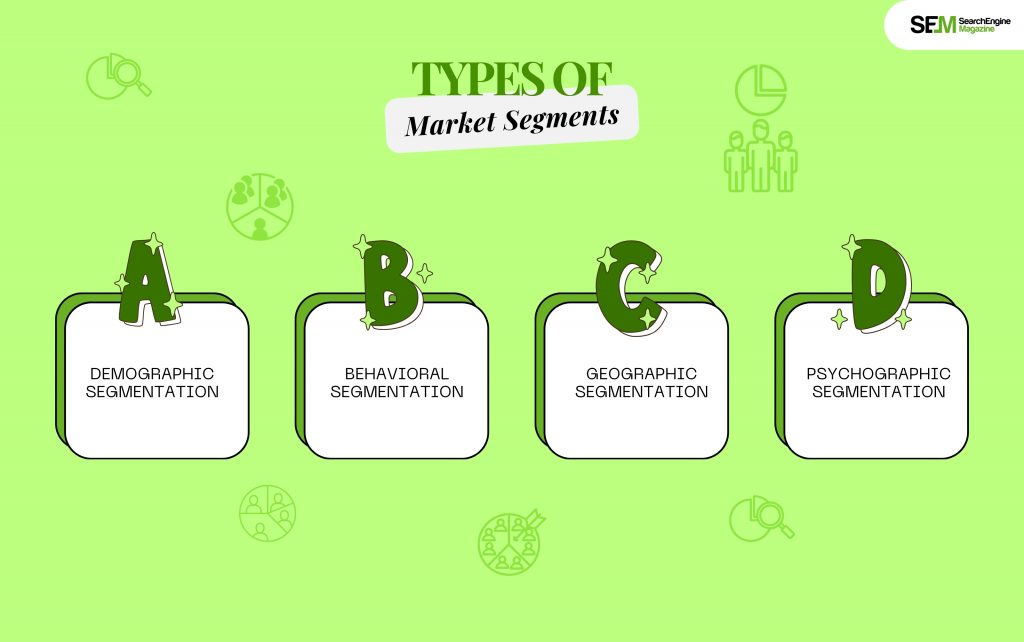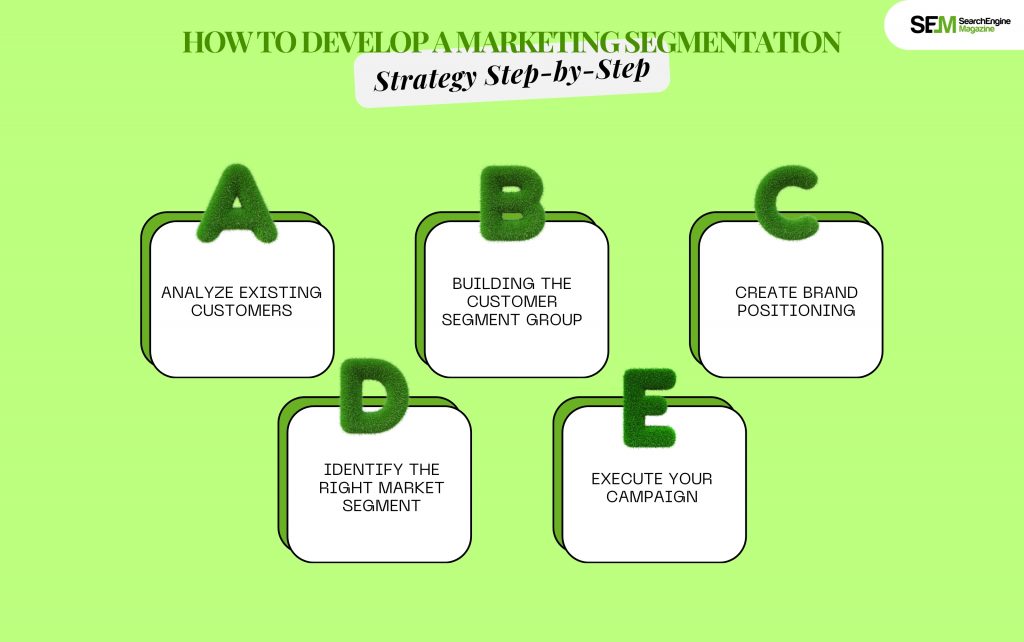How To Build An Efficient B2B Demand Generation Strategy In 2025?
Jul 07, 2025

Jul 07, 2025

Jul 07, 2025

Jul 04, 2025

Jul 03, 2025

Jul 01, 2025

Jun 30, 2025

Jun 30, 2025

Jun 30, 2025
Sorry, but nothing matched your search "". Please try again with some different keywords.


Segmentation is a process that divides the market as well as the target audience, which is generally based on commonalities and homogeneity.
There are many factors that world with it like different attitudes of customers towards the product, behaviour traits, demographic factors like age, marital status, gender, and their social strategies. Market segmentation is the main source of market research and success for any business.
In other words, market segmentation helps in segregating the consumer market and identifying the promising markets in which the business can grow and flourish. Not only that, but it helps the marketing team to plan and organise the marketing campaign.
In this article, we will be discussing the 10 importance of Market Segmentation and why is it necessary to divide the market into segments. Let’s start, shall we?

There are types of market segments that every company makes use of to show why it is necessary to divide the market into segments. Here are the types of market segmentation that you can try under the importance of market segmentation.
Demographic segmentation is the most common type of segmentation; it consists of target audiences that are divided into qualities like gender, age, education, occupation, nationality, and income.
It is considered to be the easiest way to divide a market. If you are able to differentiate demographic market segmentation from other market segmentation then it helps you narrow down, even further. The information that a company needs for demographic segmentation is easy to find and does not cost much.
Like I have mentioned earlier that segmentations are based on consumer’s behaviors. When a company divides their target market which is based on the behaviors, it allows them to create specific messaging that accommodates to those behaviors.
Here are some behaviours that includes:
All these information are important as they are related to consumers’ interactions with your service or products. Therefore marketers can easily understand their strategies through this and can make more effectively.
This segmentation is used for splitting up a market based on location. Even though it is quite basic, it is actually very effective. If a company knows where the customer is, then it becomes easy for them to understand the needs of the customer. A bonus for companies is that they can target their customers with location-specific ads.
It is not that hard to divide a segment that stands on locations, county, town,zip code and country. Now that you can do it easily, you can also identify the customers based on the climates they are in, or live in and the population density there. This helps the marketers to be even more specific with messaging and targeting.
When the companies are targeting unlike geographic segments, marketers have to focus on the language, as it may change the dependency on the region.
This form of segmentation is similar to demographic segmentation, as it deals with characteristics that relate to mental and emotional attributes. The division by this form is based on the customer’s personality traits, interest, attitude, values and of course lifestyle.
Demographics are easier to observe, but psychographics offers marketers valuable insights into the consumer’s motives, needs and preferences. With the help of it, marketers are capable of developing content that is relatable to the customer segments.
Demographic merges well with psychographic segmentation. If you think that your messaging is not that good for your demographic segment, then you are allowed to include psychographic information. It will let you know why people are buying certain products and why they aren’t.
You may like to read: How Social Media Can Help Your Business?

Marketing segmentation is an important process for any business undertaking the task to target the right audience using specific messages, offers, and campaigns. It helps know exactly what needs, behaviors, and preferences of customer groups are; therefore, creating the most appropriate marketing strategies. Here’s a step-by-step approach on how to develop a winning marketing segmentation strategy:
Knowing who you are serving is the starting point of a segmentation strategy. It involves gathering and analyzing data regarding the customers you serve, what they buy, and how they interact with your brand. The more specific the data, the more accurately you can segment and target.
Analyzing the existing customers helps to know what your most profitable segments are and what aspects motivate these customers to make a purchase.
After analyzing your existing customers, then building differentiated customer segments comes. Organize your customers based on similar characteristics or behaviors which may help you in developing individualized marketing strategies.
This stage is about grouping customers in a way that makes it easier to craft personalized marketing messages that resonate with each segment’s unique characteristics.
Having determined your customer segments, you will then develop a clear brand positioning strategy for each of these groups. Brand positioning is how you want your brand to be perceived by your target segments compared to competitors.
Brand positioning ensures that your marketing messages speak directly to each segment’s needs and helps differentiate your offerings from the competition.
You’ve built your customer segment and established your brand positioning. You have to now decide which of them to pursue and rank them. Not all are equal, nor are they all worth pursuing. You have to judge their success potential.
Balancing opportunity with resources and ensuring the segments you focus on fit both your short-term and long-term business goals, is key to finding the right market segment.
Now you have your segmentation strategy and are ready to implement targeted marketing for each of the segments you’ve identified. That is when your segmentation strategy really comes to life.
A well-implemented campaign will go exactly after the needs and desires that make for their proper targets, increasing engagement, conversion, and customer loyalty.

Here are 10 Market Segmentation Importance points that you should go through whenever you are dealing with segmentations.
Market segmentation stands for the study of your market; to be more clear, it helps in dividing a bigger market and turning them into smaller modules.
It lets the marketers know about the potentiality of the consumers and market. It, therefore, reduces the chances of loss and brings higher success for the business.
Market segmentation is one of the effective ways for business, as it helps in the business to target some particular segments of the market and therefore helps to find better business offers and opportunities.
The marketers can strategise their own campaigns as the needs of the chosen market, which further helps in increasing the business profitability. This amazing technique helps the company focus on a particular segment rather than the entire market which in return gives increased profit.
When the focus along with the target is identified by the marketers and the business team, competitiveness steps in. As the target market is pretty known to the business therefore the competition will increase and the marketing team will show their creative side by some innovative ideas, through which they can promote their brand.
Discounts and coupons will help a company to attract customers, and knowing what your customer is looking for will help you get their loyalty for your brand.
Read more: Important Aspects of Digital Marketing Strategy for a Successful Business
Retaining customers is very important for business and market segmentation. Once the business is close enough to the customer to know about them properly, their needs can be easily catered. Their experience with the market brand will connect to the product.
Market segmentation helps in the identification and recognition of potential market opportunities. The area where the customers are less satisfied with other brands in the area for your brand to build itself by focusing on the needs of the customer.
The companies can keep working in these segments and provide a better product to the customers than the existing brand. If you can satisfy the needs of the customer and give them what they exactly want, you can earn the customer’s trust as well as their loyalty. Market segmentation gives good opportunities.
As the business is already with the information of the needs of the customers, therefore the marketing team can customise and personalise their strategy in marketing.
Not only that but organise their strategies as well that match with the needs of the market. This technique shows the straight ways to the success of the business.
It helps in saving unnecessary time along with the effort that is engaged in the marketing campaign. It is identified by the potential areas of the entire market.
Therefore it helps in using the company’s resources as well as the money in an efficient manner.
It guides the company in making its marketing efforts consumer along with the market orientation of a specific market segment.
It also asks the companies to serve the consumers better so that he or she finds satisfaction in your product or service. Which eventually becomes the ultimate goal of the business.
Efficient market segmentation helps in saving time, money and resources that are invested in the marketing campaign. It also helps in understanding the customer’s needs, commonalities, choices and statuses.
As targeting audiences are easy for the marketers, therefore with the help of market segmentation, the campaign is conducted in a proper and smooth way, with a cost-effective manner.
Market segmentation is capable of helping to study the market needs along with its potential consumer, which helps in reducing the risk of losing campaigns. Since the market research is done before the campaign, there are chances of success than the marketers who do not study or analyse the imaginary scenario.
It is very important to understand what the customer and the markets are demanding based on their actual needs. Effective marketing can only come into play if the promising market has been identified or all the efforts are nothing.
There you go with the Top 10 Importance Of Market Segmentation? Why Is Market Segmentation Important?. This article will let you know what market segmentation is, their types, and finally the 10 importance of it.
Leave a comment in the comment section and let us know what you think about this article. You can post your doubts if you have any; we will try to come up with a relevant answer like we always do.
Read Also:
Nabamita Sinha loves to write about lifestyle and pop-culture. In her free time, she loves to watch movies and TV series and experiment with food. Her favorite niche topics are fashion, lifestyle, travel, and gossip content. Her style of writing is creative and quirky.
View all Posts
How To Build An Efficient B2B Demand Generati...
Jul 07, 2025
Lovo AI: Is This AI-Powered Voiced Generation...
Jul 07, 2025
How AI-Powered CRM Is Contributing To Smarter...
Jul 04, 2025
The Role of Pipedrive CRM in Streamlining Dat...
Jul 03, 2025
What Happens to Digital Assets During Probate...
Jul 01, 2025

